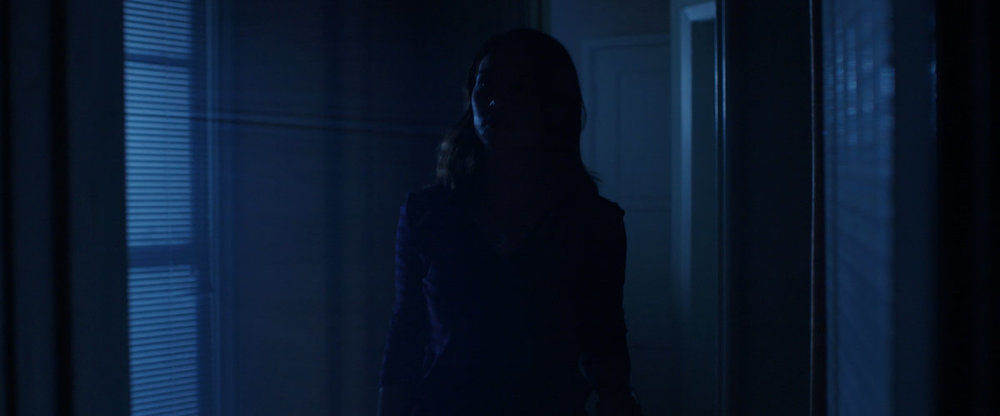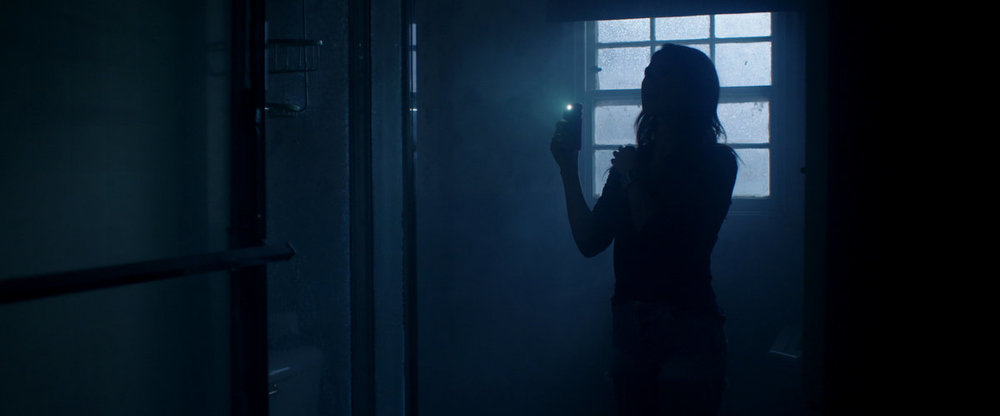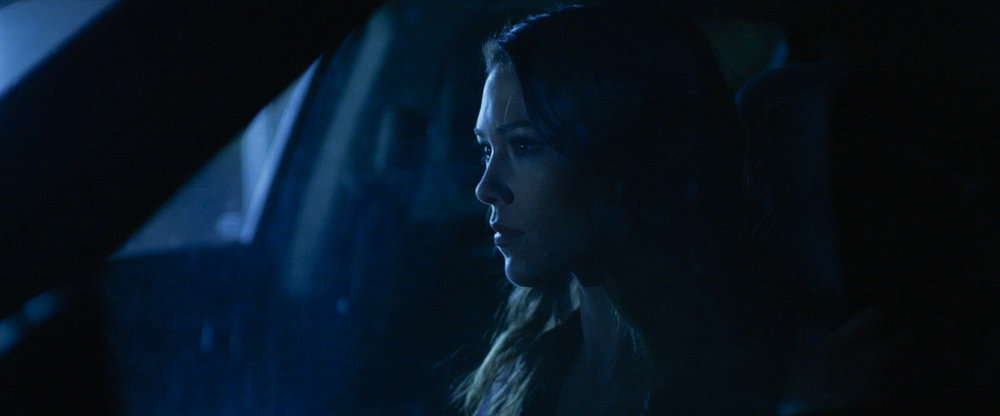
Stuart Brereton
Basic Member-
Posts
3,955 -
Joined
-
Last visited
Everything posted by Stuart Brereton
-
How to Light Moonlight motivated Interiors
Stuart Brereton replied to Haroon Saqib's topic in Lighting for Film & Video
It really depends on the scene. What is happening, and what do you need to be able to see? Here's a couple of frames from a movie I shot a couple of years ago. The character is exploring a house at night. It's meant to be dark and mysterious, and we already know who the character is, so I let her play mostly in silhouette. We also created little pools of light that she could walk through so that we could occasionally see her face. In another scene, where she was on the phone, we needed to see her face more clearly, so I brought the moonlight a little from the side to light her face. It's still pretty dark, but as soon as she answers her phone, she's lit by that as well. -
How to Light Moonlight motivated Interiors
Stuart Brereton replied to Haroon Saqib's topic in Lighting for Film & Video
David, can you recall your setup for the foyer part of the shot? Was it just the two table lamps, or is there a soft fill source in there as well? -
Any New Blackmagic Camera Announcement in 2020/21?
Stuart Brereton replied to Haik Yan's topic in BlackMagic Design
Seems unlikely, given that the 6k camera is a new addition to their line. Announcing new cameras has an adverse effect on existing sales.- 1 reply
-
- blackmagic
- bmpcc
-
(and 1 more)
Tagged with:
-
ACHTEL 9×7 65 Megapixel Motion camera
Stuart Brereton replied to YongLee's topic in General Discussion
It's worth noting that there is currently a debate going on over at CML about whether some of those specs are accurate. Time will tell, but for now it's probably best not to consider them confirmed. -
Advice Needed For Changing Aspect Ratio
Stuart Brereton replied to Willem Jansen's topic in Post Production
That's actually probably one of the worst ways to do it. There are plenty of non destructive ways in NLEs to crop and reframe, and they can do it In real time. -
I think most of us are in agreement that this issue is much more complicated than many people would like to believe, and as such the solutions are likely to be as well. At the very least, there are two facets to the problem. First is the issue of discrimination within the industry, that which happens at the gates, as it were, and stops people from minority groups from entering or progressing through the industry. The second is a kind of societal, cultural conditioning which happens throughout life which might prevent people from these groups even attempting to enter this industry. As an industry, there's not much we can do about the latter, but we can take steps to address the former. I've stated my reservations about positive discrimination here already, so I won't rehash them, so I'll say that I can accept it as a necessary evil, if we can acknowledge that it is an unfair and imperfect solution, and that it's unlikely to solve the problem by itself. That is going to require a willingness to accept and confront much bigger societal issues.
-
Experimenting with 'blowing the image up'
Stuart Brereton replied to Anne Bauchens's topic in Post Production
Godwin’s law came early this time.- 13 replies
-
- 1
-

-
- digital softening
- blowup
-
(and 1 more)
Tagged with:
-
And you know this how? There is no evidence to suggest that all people want the same things equally. It's an idea that's not supported in any other industry. Here's an observation, based on 25 years working on set. Roughly 90% of the hair, make-up and wardrobe departments are women. Only around 10% are men. Why is that? Are men being discriminated against? Is there a gender barrier to these departments? Or is it that there is another cultural reason for this "under-representation". Assuming that participation would be equal is just lazy thinking. I have never denied that there is discrimination. The sentence you've quoted is quite clearly framed as a question, hence the question mark at the end it. You're again accusing people of saying things they did not say. You're "sure", are you? How are you sure? Have you studied this? You have an insultingly reductive view of what it means to work in these departments. You don't just fall into the HMU department, you have to train, to study. Likewise with Art. There's not many production designers out there with no art background. In my experience, the crew in these departments are dedicated, trained professionals who love what they do. In all my time on set, I've never once heard a make-up artist say "but what I really wanna do is Key Grip". Your entire post is a series of unsupported assertions and straw man arguments, with very little in the way of substance. In as much as you have a position at all, it seems to be that discrimination on the basis of race and gender is just fine, as long as it's directed at white men.
-
Larry, Accusing others of holding views that they haven't actually proposed, without offering any solution of your own is rarely helpful in a discussion. To address your points: We do need to study the problem. We need to know what levels of participation we should reasonably expect from minority groups, given a non discriminatory industry. If we don't know that, how will we ever know that the measures are working? This relates to the previous point. If the levels of participation are not what we would expect, why aren't they? Is there discrimination that we're not seeing? Is there an attitude being indoctrinated into minority groups earlier in education that prevents them from seeing this industry as a viable career? Or do they simply not want to be in this industry in the numbers we imagine? This last is necessarily a generalization of the industry as a whole rather than specific roles within it. For instance, in my experience, women are very well represented in HMU, Wardrobe, Art, and Production departments, but rather less so in G&E and Transpo. Is this down to discrimination or just natural preference? Positive discrimination, by its very nature, picks winners and losers on the basis of protected characteristics, something which is otherwise illegal. You cannot claim to be against discrimination that keeps you out of an industry, whilst being for discrimination that keeps someone else out out. It's an extraordinarily complex issue, with no easy answers.
-
I think the problem here is that the ideal solution, that of removing all discrimination against any group of people and then allowing the industry to gradually equalize to a natural level as older, white males retire, will take years, maybe even a generation. Naturally, people want a faster solution, and positive discrimination offers just that. Many people in minority groups, having felt discriminated against themselves, are not particularly concerned with whether positive discrimination is unfair. The problem is, as Phil says, policies like this are applied to groups of people, but they affect individuals, people who have personally done nothing wrong. As someone who has been on the receiving end of this more than once, it's hard not to feel bitter, no matter how 'just' it might be. A policy that breeds bitterness and discontent amongst the workforce is not generally considered desirable. Another question is, at what point does this policy stop? Who decides when the industry is 'fair'? As Phil has pointed out, without knowing what a 'natural' state of the industry would reasonably be, how can we determine when we've reached it? I'm not advocating doing nothing, I'm just saying that you cannot achieve an objective without fully understanding what that objective is. So we are left with two imperfect solutions, one that is fair, but will take years to achieve results, and one which is unfair, but will yield short term gains. It is inevitably going to be a matter of opinion as to which one is best.
-
If it had been intriguing as well as confusing, I might watch it again. Sadly, it wasn’t. I do admire Chris Nolan for his willingness to tackle big ideas and concepts, but Tenet is just riddled with plot holes and nonsense. If you strip away the time inversion gimmick it’s just a secret agent movie about stopping a dastardly villain from destroying the world, something that has been done 26 times by the Bond movies alone. If your whole claim to originality is based on a dramatic concept that apparently most of your audience don’t understand, I think you’ve failed.
-
The dialogue mix wasn’t terrible, although there were definitely moments when it couldn’t be heard, and it could generally have been higher in the mix. The main problem for me was that the central idea of the movie is either nonsense, or so poorly explained that it might as well be nonsense.
-
Saw it yesterday, digitally projected. Looked very nice. Unfortunately, the film itself is virtually incomprehensible, and no amount of pretty pictures can change that.
-
Lion Color Grading (Olivier Fontenay)
Stuart Brereton replied to Robbie Fatt's topic in Post Production
As Dan says, Fraser could well be setting the camera at a high-ish ISO, and then underexposing. Because that will tend to crush the blacks, they are then being raised in post to flatten out the contrast, almost to the point where they become noisy. Those stills are low contrast, slightly underexposed, lifted blacks, reduced saturation. A lot of it will come down to your source material, but you could try not using a 709 LUT in post, but instead adding a mild curve to the LOG footage, and then adjusting contrast and saturation from there. I don't know if there are any professional colorists on the forum, but hopefully they'll chime in if so. -
An incident meter measures the light falling upon a subject, and gives you a reading for a hypothetical 18% gray. If you expose per the meter, then every object that is lit by that source will be exposed properly in relation to the gray. That’s why incident meters are so useful, because they take no account of the subject, so you don’t need to figure how many stops over or under the reading an object should be. if you point a spot meter at a black object, the reading you get will be to expose the black as 18% gray, so you need to know how much darker black is than gray, and adjust your exposure accordingly. Spot meters see everything as 18% gray. If you don’t know how to interpret the readings, your exposures will vary wildly.
-
https://documents.blackmagicdesign.com/UserManuals/BlackmagicPocketCinemaCameraManual.pdf?_v=1585983611000






